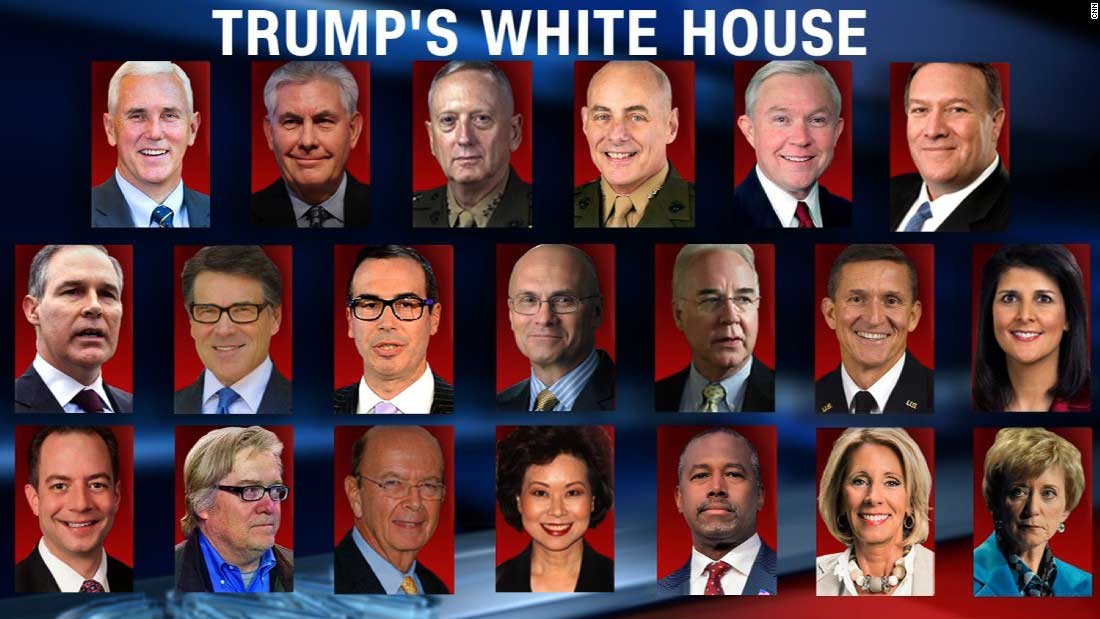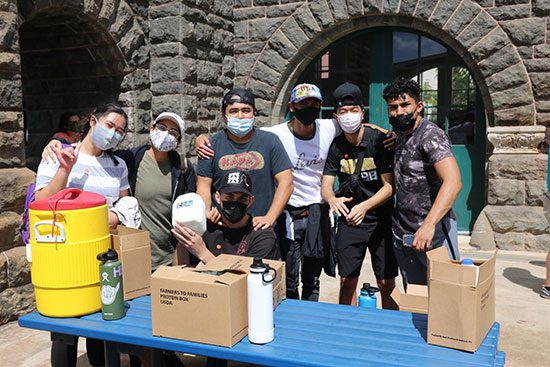
By the time Donald and Melania Trump had their first dance at the inaugural ball Jan. 20, President Trump had two Cabinet members in place. Two weeks into his presidency, he had six. Trump has the fewest Cabinet secretaries confirmed at this point in his presidency than any other president at least since World War II.
On his first day in office, Jimmy Carter had eight of his Cabinet nominees confirmed. Within 24 hours after his inauguration, Bill Clinton had 13 in place. Barack Obama had seven in place by the time he and Michelle Obama had their first dance.
Trump has a historically low number in place for a president’s first few weeks in office, despite the fact that Republicans control the Senate by a margin of 52-48.
Democrats’ only option to oppose Trump and his Cabinet picks, many of whom are ultra conservative, have been to delay the inevitable by asking some nominees back for more questions, requesting second hearings, refusing to vote and even boycotting some committee hearings, as they did for Steve Mnuchin and Tom Price.
“It would help if the Democrats weren’t working overtime to unnecessarily block our very qualified nominees that we could put leadership in place at each of the agencies,” said White House principal deputy press secretary Sarah Huckabee Sanders in an email to NPR.
“We are holding Trump nominees’ feet to the fire, demonstrating to the world that many of them are either unqualified or extreme or ethically challenged,” said Virginia Senator and Hillary Clinton’s running mate Tim Kaine in an interview on NBC’s Meet the Press. “I have never seen calls to my office from folks the way I’ve seen them over these Cabinet nominees. And that’s because a lot of us on the Democratic side are casting a spotlight on what (Republicans) are doing.”
Another thing that’s slowing down the process is that candidates for Cabinet were announced before they were pre-vetted by the Office of Government Ethics (OGE), which identifies and exposes potential conflicts of interest. Several Cabinet-level picks still haven’t completed that process. Walter Shaub, director of the OGE, has not disclosed which nominees have not completed the vetting process.
While it’s been customary for the next president to pick an appointee from the opposite party to extend the olive branch, none of Trump’s Cabinet nominees are Democrats. Trump’s Cabinet picks consist mainly of conservative, white males. Only 20 percent are women, and very few are minorities.
Despite widespread Democratic opposition, Trump’s Cabinet nominees are expected to be confirmed. Here’s a quick look at some of them:
Secretary of State
(R) Rex Tillerson – Confirmed by Senate 56-43, Feb. 10
Tillerson, the former CEO of ExxonMobil, a multinational gas and oil corporation, is the first secretary of state without government or military experience who would be responsible for advising the president on foreign policies.
His close business ties to Russia, which dates back to 1990 when he assumed responsibility for all ExxonMobil’s holdings there, has raised scrutiny among Democratic lawmakers. In 2011, the company made a deal with Russian oil company Rosneft, which at the time was 75 percent owned by the Russian government, that gave ExxonMobil access to Arctic oil deposits. The same year, Tillerson received the Order of Friendship from Russian president Vladimir Putin.
Democrats Mark Warner (Va.), Heidi Heitkamp (N.D.) and Joe Manchin III (W.Va.) crossed party lines and voted “yes” for Rex Tillerson.
Attorney General
(R) Jeff Sessions – Confirmed by Senate 52-47, Feb. 8
Sessions has represented Alabama in the U.S. Senate since 1997. His nomination as the head of the Department of Justice drew significant criticism from Democrats and civil rights groups.
In 1986, Sessions failed to be confirmed as a federal judge due to racially-tinged remarks that he had made calling the National Association for the Advancement of Colored People “un-American” and “communist-inspired.” At the time, Martin Luther King Jr.’s widow, Coretta Scott King, wrote a letter to Senator Strom Thurmond to block his nomination, saying that allowing him to join the federal bench would “irreparably damage the work of my husband.”
Sessions is opposed to any immigration reform and believes that there need to be strong controls on the border with Mexico. He is also anti-abortion, a major opponent of same-sex marriage and is known for the Victims of Child Abuse Act Reauthorization Act, which would reauthorize funding through 2018 to help victims of child abuse.
Joe Manchin III (W.Va.) was the only Democrat to cross party lines and voted “yes.”
Secretary of Education
(R) Betsy DeVos – Confirmed by Senate 51-50, Feb. 7
For nearly 30 years, DeVos has pushed to give families taxpayer money in the form of vouchers to attend private and parochial schools, pressed to expand publicly funded but privately run charter schools and tried to strip teacher unions of their influence.
She chairs the American Federation for Children, a group that promotes charter school education, and she served on the board of the Foundation for Excellence in Education, a group led by former Florida Gov. Jeb Bush, which promoted school choice and the Common Core education standards that Trump opposes.
During her hearing, DeVos refused to agree with Senator Tim Kaine (D-Va.) that all schools that receive public federal funds–whether they be traditional public, public charter or private schools that receive voucher money–should be held to the same standards of accountability. Democrats are worried that DeVos will undermine public education across the country.
Republicans Susan Collins (Maine) and Lisa Murkowski (Alaska) crossed party lines and voted “no” against Betsy DeVos. Vice President Mike Pence voted “yes” to break the 50-50 tie.
Secretary of Health and Human Services
(R) Tom Price – Confirmed by Senate 52- 47, Feb. 10
Price, an orthopedic surgeon, is the first Health and Human Services secretary with a medical background since Dr. Louis Sullivan, who served under George W. Bush from 1989 to 1993. The former U.S. Representative from Georgia’s top priority as health secretary will be to dismantle the health reform law that his two predecessors spent six years implementing.
“The purpose of health reform should be to advance accessibility, affordability, quality, responsiveness and innovation,” Price said in 2011, a year after Obamacare was signed into law. “None of these are improved” by the Affordable Care Act, he added.
He has given few details on his new reform.
Administrator of the EPA
(R) Scott Pruitt – Confirmed by Senate 52-46, Feb. 17
The Oklahoma attorney general’s biography page states that Pruitt is a “leading advocate against the EPA’s activist agenda.” Pruitt has also written a letter to the EPA accusing it that “federal regulators were grossly overestimating the amount of air pollution caused by energy companies drilling new natural gas wells in his state.”
Pruitt is a prominent denier of climate science and wrote in the National Review last May that “scientists continue to disagree about the degree and extent of global warming and its connection to the actions of mankind.”
Democrats Joe Manchin III (W.Va.) and Heidi Heitkamp (N.D.) voted “yes” while Republican Susan Collins (Maine) voted “no.”
Withdrew or Resigned
National Security Advisor – Michael Flynn
The retired Army lieutenant general resigned on Feb. 13 after it was revealed that he had given “incomplete information” to Vice President Pence and other top White House officials regarding a telephone call he had with the Russian ambassador in late December about American sanctions against Russia, weeks before President Trump’s inauguration.
He held the position for less than a month.
Flynn is being replaced by Lieutenant General Herbert Raymond “H.R.” McMaster who has no prior link to President Trump and is not thought of being as ideological as the man he will replace.
Secretary of Labor – Andrew Puzder
The fast food executive Andrew Puzder withdrew his nomination on Feb. 15 as both Republicans and Democrats opposed his nomination.
The opposition from Republicans was among senators John Thune (S.D.), Rob Portman (Ohio), Thom Tillis (N.C.), Susan Collins (Maine), Johnny Isakson (Ga.), Lisa Murkowski (Alaska) and Tim Scott (S.C.).
Democrats cheered Puzder’s withdrawal as a victory for working Americans. The Labor Department regulates workplace safety, enforces wage and hour laws, maintains unemployment and payroll data and is generally seen as an advocate for workers. Puzder opposes the Affordable Care Act and is skeptical of minimum wage and overtime rules.
“The simple truth is that, given his relationship to employees at the companies he runs, he was not fit to lead a department responsible for defending workers’ rights,” said Senator Bernie Sanders, an independent from Vermont who ran for the Democratic presidential nomination last year.
Puzder is being replaced by Rene Alexander Acosta, dean of the Florida International University College of Law and former assistant attorney general. Labor groups that assailed Puzder as being anti-worker applauded the choice of Acosta.
Acosta’s hearing is still to be determined. If confirmed, he will be the only Hispanic in President Trump’s Cabinet.
by Deborah Higa, Ka ‘Ohana Co-Editor in Chief





